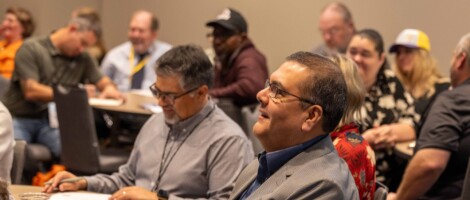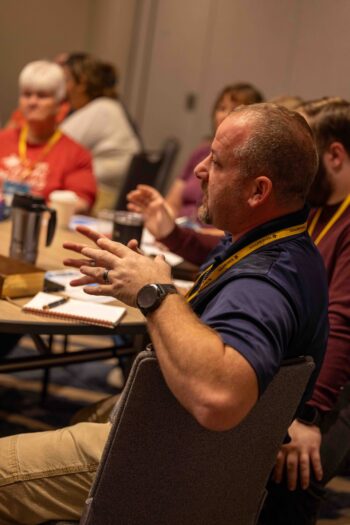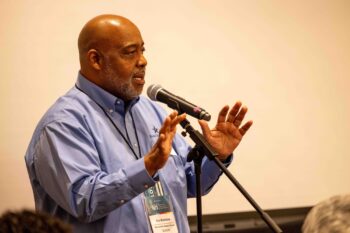Annual Meeting workshop teaches how churches in smaller towns can still make a big impact
by Teresa Young on November 17, 2025 in News

Having a church in a smaller or rural area does not have to mean there is no impact in the community for Christ, said Ira Antoine and other speakers in the “Thriving Churches in Small Towns and Rural Communities” workshop held Monday.
Antoine is the director of bivocational ministry in the Center for Ministerial Health with Texas Baptists and is a bivocational pastor himself in Goliad. The workshop included input from Ruben Castillo, pastor of Bayside Community Church in Ovilla, and Albert Walker, pastor of Mt. Pisgah Baptist Church in Mathis.
Antoine opened with encouragement that the majority of Texas Baptists churches are small membership churches, and that 97 percent of the state’s population live in communities of 50,000 or less. As younger people move out of small cities and older retirees often return there, the demographic changes bring plenty of challenges for churches in smaller communities. Regardless, Antoine said small churches can still thrive in these cities.
“We often get into survival mode, but if we focus on how we begin to thrive with what we have, it’s going to make a difference. It’s not about us that things are happening, it’s a God thing,” said Antoine. With a brief introduction of their own churches, Castillo and Walker backed up that claim.

Castillo said his church, located in a community of 110, averages 135 in attendance on Sundays and has seen the church grow and serve its city. Likewise, Walker said his church started with eight and has grown to 115 with a pending building project, all of which he attributes to listening to and meeting the community’s needs.
Antoine presented three Ps that are key to reaching the masses in small towns or rural areas: presence, presents and patience.
“If we want our congregations to thrive, we must have presence. In these smaller communities, presence is everything. Where do you meet them?” asked Antoine, noting that grocery stores, school sporting events, coffee shops, restaurants and even the local cotton gin are popular spots. “Building relationships is the key, and being present helps. We have to learn how to get out of our churches and be in those spaces.”
For Walker, that presence became very real as the city experienced a series of drownings in a nearby lake, and the community was hurting as they processed the loss of children and adults.
“The church saw the need and wanted to help them handle this. We reached out to the families, were at all the funerals and vigils, then afterwards showed up with the kids trying to process the loss of their classmates,” Walker explained. “We are helping them process grief and being real and present in those spaces. They know we’re going to be there in a time of crisis and need. We’re going to give them Jesus and walk them through any struggles.”
Castillo noted that presence for the Ovilla church involved seeing the poverty level and knowing that food insecurity was a problem there. They mobilized their senior adults, and they began a food pantry with simple requests for nonperishables.
“That has grown to signing a contract with an area food bank to purchase food, and we’re now feeding 1,100 to 1,200 people a month,” said Castillo. “The pantry grew so big that we’re planting another church in Ganado and have a mobile trailer that we take there to hand out food. When there’s a disaster, everyone shows up, but then afterward, that’s where the local church stays and can help keep things going.
“The church made a commitment to God, and he’s blessed us with two mobile trailers and two trucks. Don’t forget the hidden resource in your senior adults,” he added.

Walker chimed in agreement at intergenerational exchanges, encouraging churches to learn the language, context and culture of the generations so they can relate to them and pour into them. But he also encouraged listening and learning from the younger generations so they can better connect and influence them positively with the gospel.
Others in the audience shared similar ideas, such as Kids Catching Christ, run by Mary Robertson in Sargent and featuring an intergenerational effort to both disciple all ages as well as train older teens to train younger students. One attendee mentioned substitute teaching in smaller communities – which remains a great need in many cities – as a way to make a positive impact among young people. Another attendee mentioned serving with the volunteer EMS or ambulance.
Antoine also mentioned the importance of presents to reach the community, meaning being a resource in the community and knowing the real and felt needs that exist. He suggested asking key individuals in the community to determine the biggest needs that the church may be able to meet, including the high school principal or counselor, the mayor or county commissioner and, if possible, a doctor.
He noted that this does require great confidentiality and overcoming pride, but it will result in the church being seen as the go-to place in the community.
Walker noted that in his community, they partnered with a nonprofit to provide free physicals for students in athletics and vaccines. A mobile trailer visits the city to offer these sessions, and a new partnership with an area food bank will mean a trailer visits monthly to meet the food needs. The church also offers mental health seminars and a counselor who provides one-on-one counseling at a reasonable rate on a monthly basis, as needed. He noted that the church’s app helps connect the community with various forms of assistance.
For Castillo, this meant certifying several in the congregation in order to become a Red Cross shelter. During Hurricane Harvey, they fed 850, and a partnership with local emergency management provided a generator to power a shelter for 300 people.
“We got certified and trained, and people started coming in, and this is how the church won the community,” noted Castillo. “People started saying, ‘Wow! People really do care.’ And when they know you care, they start supporting you.”
The church also created a homeschool discipleship center to serve special needs students in the community, purchasing curriculum and using retired teachers to lead the effort.
The final point, Antoine said, was to have patience. He noted that in working in the community, churches will need to be loving and available regardless of the life situations of those they will serve.
“Once we open ourselves up to God and say, ‘Here am I, send me,’ be ready to be sent to places you didn’t think you would want to go,” said Antoine. “Unbelievers do unbeliever things, and if we’re honest, there are times when believers do unbeliever things too. The bottom line is you will find people – no matter where – that will do people things. But you have to respond like Christ.”
“When people do people things, it’s our responsibility to bring Jesus,” added Walker.
Strengthening a multiplying movement of churches to live out the Great Commandment and Great Commission in Texas and beyond.
The ministry of Texas Baptists is made possible by giving through the Texas Baptists Cooperative Program, Mary Hill Davis Offering® for Texas Missions, Texas Baptists Worldwide and Texas Baptist Missions Foundation. Thank you for your faithful and generous support.
Subscribe to receive stories like this one directly to your inbox.
We are more together.
Read more articles in: News, Annual Meeting
More from Teresa Young
- Texas Baptists Indemnity Program offers additional options for church insurance coverage
- Pastor Strong program helps ministers maintain health on all levels
- Missions Dinner emphasizes church planting successes
- Elijah Brown urges Texas Baptists to follow the first church’s paths to further the gospel
- Churches encouraged to awaken their hearts for missions to see gospel growth